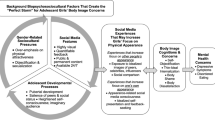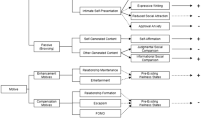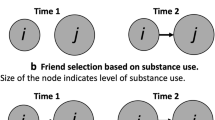Abstract
Morality, competence, and sociability have been conceptualized as fundamental dimensions on which individuals ground their evaluation of themselves and of other people and groups. In this study, we examined the interplay between self-perceived morality, competence, and sociability and relationship quality within the core social contexts with which adolescents have extensive daily interactions (family, friends, and school). Participants were 916 (51.4% girls; Mage = 15.64 years) adolescents involved in a three-wave longitudinal study with annual assessments. The results of cross-lagged analyses indicated that (a) self-perceived morality was more important than self-perceived competence and sociability in strengthening family, friend, and school relationships; and (b) high-quality friendships led to increasing levels of self-perceived morality over time. Overall, this evidence advances our theoretical understanding of the primacy of morality from a self-perspective approach and highlights the developmental importance of friends.

Similar content being viewed by others
Notes
The datafile and all Mplus input files can be obtained by the first author upon request.
As a preliminary step, longitudinal measurement invariance (Little, 2013; Van de Schoot, Lugtig, and Hox, 2012) for all study variables separately as well as for the total model including all latent variables (with six latent variables— morality, competence, sociability, and family, friend, and school relationships—for each wave; for a total of 18 latent variables) was tested. Thus, the configural (baseline) models were compared with the metric models, in which factor loadings were constrained to be equal across time. Significant differences between the configural and the metric models required that at least two out of these three criteria had to be matched: ΔχSB2 significant at p < .05, ΔCFI ≥ −.010, and ΔRMSEA ≥ .015 (Chen, 2007). The findings indicated the two models did not differ substantially (this was confirmed for each variable separately, as well as for the total model including all variables). Therefore, metric invariance, which is the level of invariance required for examining reliably over time associations between variables (Little, 2013), could be clearly established. The fit of the total metric model was found to be good (χ2 = 6764.740, df = 3720, TLI = .893, CFI = .901, RMSEA = .030 [.029, .032]).
References
Abele, A. E., & Wojciszke, B. (2007). Agency and communion from the perspective of self versus others. Journal of Personality and Social Psychology, 93, 751–763. https://doi.org/10.1037/0022-3514.93.5.751.
Abele, A. E., & Wojciszke, B. (2014). Communal and agentic content in social cognition: A dual perspective model. In M. P. Zanna & J. M. Olson (Eds.), Advances in experimental social psychology 50, (195–255). Burlington: Academic Press.
Albarello, F., Crocetti, E., & Rubini, M. (2018). I and us: A longitudinal study on the interplay of personal and social identity in adolescence. Journal of Youth and Adolescence, 47, 689–702. https://doi.org/10.1007/s10964-017-0791-4.
Allison, S. T., Messick, D. M., & Goethals, G. R. (1989). On being better but not smarter than others: The Muhammad Ali effect. Social Cognition, 7, 275–295. https://doi.org/10.1521/soco.1989.7.3.275.
Armsden, G., & Greenberg, M. T. (1987). The inventory of parent and peer attachment: Individual differences and their relation to psychological well-being in adolescence. Journal of Youth and Adolescence, 16, 427–454. https://doi.org/10.1007/BF02202939.
Arnett, J. J. (1999). Adolescent storm and stress, Reconsidered. American Psychologist, 54, 317–326.
Bandura, A. (1977). Social learning theory. Englewood Cliffs, NJ: Prentice Hall.
Benson, P. L., Leffert, N., Scales, P. C., & Blyth, D. A. (1998). Beyond the “village” rhetoric: Creating healthy communities for children and adolescents. Applied Developmental Science, 2, 138–159. https://doi.org/10.1207/s1532480xads0203_3.
Brambilla, M., & Leach, C. W. (2014). On the importance of being moral: The distinctive role of morality in social judgment. Social Cognition, 32, 397–408.
Brambilla, M., Sacchi, S., Menegatti, M., & Moscatelli, S. (2016). Honesty and dishonesty don’t move together: Trait content information influences behavioral synchrony. Journal of Nonverbal Behavior, 40, 171–186. https://doi.org/10.1007/s10919-016-0229-9.
Brown, B.B., & Larson, J. (2009). Peer relationships in adolescence. In R.M. Lerner & L. Steinberg (Eds.). Handbook of adolescent psychology (3rd edn., Vol. 2, pp. 74–103). Hoboken, NJ: Wiley.
Byrne, B. M. (2012). Structural equation modeling with Mplus: Basic concepts, applications, and programming. 2nd edn. New York: Routledge, Taylor & Francis Group.
Caravita, S. C., Sijtsema, J. J., Rambaran, J. A., & Gini, G. (2014). Peer influences on moral disengagement in late childhood and early adolescence. Journal of Youth and Adolescence, 43, 193–207. https://doi.org/10.1007/s10964-013-9953-1.
Carnes, N. C., Lickel, B., & Janoff-Bulman, R. (2015). Shared perceptions: Morality is embedded in social contexts. Personality and Social Psychology Bulletin, 41, 351–362. https://doi.org/10.1177/0146167214566187.
Chen, F. F. (2007). Sensitivity of goodness of fit indexes to lack of measurement invariance. Structural Equation Modeling, 14, 464–504.
Christy, A. G., Seto, E., Schlegel, R. J., Vess, M., & Hicks, J. A. (2016). Straying from the righteous path and from ourselves: The interplay between perceptions of morality and self-knowledge. Personality and Social Psychology Bulletin, 42, 1538–1550. https://doi.org/10.1177/0146167216665095.
Cohen, J. (1988). Statistical power analysis for the behavioral sciences. New York: Academic Press.
Cooley, C. H. (1902). Human nature and the social order. New York: Scribner.
Cottrell, C. A., Neuberg, S. L., & Li, N. P. (2007). What do people desire in others? A sociofunctional perspective on the importance of different valued characteristics. Journal of Personality and Social Psychology, 92, 208–231. https://doi.org/10.1037/0022-3514.92.2.208.
Crocetti, E., Branje, S., Rubini, M., Koot, H. M., & Meeus, W. (2017). Identity processes and parent–child and sibling relationships in adolescence: A five-wave multi-informant longitudinal study. Child Development, 88, 210–228. https://doi.org/10.1111/cdev.12547.
Crocetti, E., Fermani, A., Pojaghi, B., & Meeus, W. (2011). Identity formation in adolescents from italian, mixed, and migrant families. Child and Youth Care Forum, 40, 7–23. https://doi.org/10.1007/s10566-010-9112-8.
Crocetti, E., Moscatelli, S., Van der Graaff, J., Rubini, M., Meeus, W., & Branje, S. (2016). The interplay of self-certainty and prosocial development in the transition from late adolescence to emerging adulthood. European Journal of Personality, 30, 594–607. https://doi.org/10.1002/per.2084.
Cuddy, A. J. C., Fiske, S. T., & Glick, P. (2008). Warmth and competence as universal dimensions of social perception: The stereotype content model and the BIAS map. Advances in Experimental Social Psychology, 40, 61–149. https://doi.org/10.1016/S0065-2601(07)00002-0.
De Goede, I., Branje, S., & Meeus, W. (2009). Developmental changes and gender differences in adolescents’ perceptions of friendships. Journal of Adolescence, 32, 1105–1123. https://doi.org/10.1016/j.adolescence.2009.03.002.
Elmore, R.F. (2009). Schooling adolescents. In R.M. Lerner & L. Steinberg (Eds.), Handbook of adolescent psychology (3rd edn., Vol. 2, pp. 193–227). Hoboken, NJ: Wiley.
Emler, N., & Reicher, S. (1995). Adolescence and delinquency. Oxford: Blackwell Publishers Ltd.
Epley, N., & Dunning, D. (2000). Feeling “holier than thou”: Are self-serving assessments produced by errors in self- or social prediction? Journal of Personality and Social Psychology, 79, 861–875. https://doi.org/10.1037/0022-3514.79.6.861.
Erentaitė, R., Vosylis, R., Gabrialavičiūtė, I., & Raižienė, S. (2018). How does school experience relate to adolescent identity formation over time? Cross-lagged associations between school engagement, school burnout and identity processing styles. Journal of Youth and Adolescence, 47, 760–774. https://doi.org/10.1007/s10964-017-0806-1.
Fiske, S. T., Cuddy, A. J. C., & Glick, P. (2007). Universal dimensions of social cognition: Warmth and competence. Trends in Cognitive Sciences, 11, 77–83. https://doi.org/10.1016/j.tics.2006.11.005.
Goodwin, G. P., Piazza, J., & Rozin, P. (2014). Moral character predominates in person perception and evaluation. Journal of Personality and Social Psychology, 106, 148–168. https://doi.org/10.1037/a0034726.
Graham, J., Nosek, B. A., Haidt, J., Iyer, R., Koleva, S., & Ditto, P. H. (2011). Mapping the moral domain. Journal of Personality and Social Psychology, 101, 366–385. https://doi.org/10.1037/a0021847.
Hart, D., & Carlo, G. (2005). Moral development in adolescence. Journal of Research on Adolescence, 15, 223–233. https://doi.org/10.1111/j.1532-7795.2005.00094.x.
Harter, S. (1988). The Self-Perception Profile for Adolescents. Denver, CO: University of Denver.
Harter, S. (1999). The construction of the self. A developmental perspective. New York: Guilford Press.
Jordan, A. H., & Monin, B. (2008). From sucker to saint: Moralization in response to self-threat. Psychological Science, 19(8), 809–815. https://doi.org/10.1111/j.1467-9280.2008.02161.x.
Kidd, S., Henrich, C. C., Brookmeyer, K. A., Davidson, L., King, R. A., & Shahar, G. (2006). The social context of adolescent suicide attempts: Interactive effects of parent, peer, and school social relations. Suicide and Life-Threatening Behavior, 36, 386–395. https://doi.org/10.1521/suli.2006.36.4.386.
Killen, M., & Smetana, J. G. (2008). Moral judgment and moral neuroscience: Intersections, definitions, and issues. Child Development Perspectives, 2, 1–6. https://doi.org/10.1111/j.1750-8606.2008.00033.x.
Landy, J. F., Piazza, J., & Goodwin, G. P. (2016). When It’s bad to be friendly and smart: The desirability of sociability and competence depends on morality. Personality and Social Psychology Bulletin, 42, 1272–1290. https://doi.org/10.1177/0146167216655984.
Lapsley, D., & Carlo, G. (2014). Moral development at the crossroads: New trends and possible futures. Developmental Psychology, 50, 1–7. https://doi.org/10.1037/a0035225.
Laursen, B., & Collins, W.A. (2009). Parent-child relationships during adolescence. In R.M. Lerner & L. Steinberg (Eds.), Handbook of adolescent psychology (3rd edn., Vol. 2, pp. 3–42). Hoboken, NJ: Wiley.
Leach, C. W., Bilali, R., & Pagliaro, S. (2015). Groups and morality. In J. Simpson & J. F. Dovidio (Eds.), APA Handbook of personality and social psychology. Interpersonal relationships and group processes 2, (123–149). Washington, DC: American Psychological Association.
Leach, C. W., Carraro, L., Garcia, R. L., & Kang, J. J. (2017). Morality stereotyping as a basis of women’s in-group favoritism: An implicit approach. Group Processes and Intergroup Relations, 20, 153–172. https://doi.org/10.1177/1368430215603462.
Leach, C. W., Ellemers, N., & Barreto, M. (2007). Group virtue: The importance of morality (vs. competence and sociability) in the positive evaluation of in-groups. Journal of Personality and Social Psychology, 93, 234–249. https://doi.org/10.1037/0022-3514.93.2.234.
Leary, M. (2005). Sociometer theory and the pursuit of relational value: Getting to the root of self-esteem. European Review of Social Psychology, 16, 75–111.
Lerner, R.M., & Steinberg, L. (Eds.) (2009). Handbook of adolescent psychology (3rd edn.). Hoboken, NJ: Wiley.
Little, R. J. A. (1988). A test of missing completely at random for multivariate data with missing values. Journal of the American Statistical Association, 83, 1198–1202. https://doi.org/10.1080/01621459.1988.10478722.
Little, T. D. (2013). Longitudinal structural equation modeling. New York: Guilford Press.
Meeus, W. (2016). Adolescent psychosocial development: A review of longitudinal models and research. Developmental Psychology, 52, 1969–1993. https://doi.org/10.1037/dev0000243.
Meeus, W., Oosterwegel, A., & Vollebergh, W. (2002). Parental and peer attachment and identity development in adolescence. Journal of Adolescence, 25, 93–106. https://doi.org/10.1006/jado.2001.0451.
Menegatti, M., & Rubini, M. (2012). From the individual to the group: The enhancement of linguistic bias. European Journal of Social Psychology, 42, 36–40. https://doi.org/10.1002/ejsp.856.
Moscatelli, S., Menegatti, M., Albarello, F., Pratto, F., & Rubini, M. (2018). Can we identify with a nation low in morality? The heavy weight of (im)morality in international comparison. Political Psychology. (in press)
Muthén, L. K., Muthén, B. O., (2012). Mplus User’s Guide. 7th edn. Los Angeles, CA: Muthén & Muthén.
Nada-Raja, S., McGee, R., & Stanton, W. (1992). Perceived attachment to parents and peers and psychological well-being in adolescence. Journal of Youth and Adolescence, 21, 471–485. https://doi.org/10.1007/BF01537898.
Richardson, C. B., Mulvey, K. L., & Killen, M. (2012). Extending social domain theory with a process-based account of moral judgments. Human Development, 55, 4–25. https://doi.org/10.1159/000335362.
Rubini, M., & Palmonari, A. (2006). Adolescents’ relationships to institutional order. In S. Jackson & L. Goossens (Eds.), Handbook of adolescent development (pp. 264–283). Hove, NY: Psychology Press.
Sameroff, A. J. (Ed.) (2009). The transactional model of development: How children and contexts shape each other. Washington, DC: American Psychological Association.
Satorra, A., & Bentler, P. M. (2001). A scaled difference chi-square test statistic for moment structure analysis. Psychometrika, 66, 507–514.
Schwartz, S. H. (1992). Universals in the content and structure of values: Theory and empirical tests in 20 countries. In M. Zanna (Ed.), Advances in experimental social psychology 25, (1–65). New York: Academic Press.
Sherif, M., & Sherif, C. (1964). Reference groups exploration into conformity and deviation of adolescents. New York: Harper & Row.
Shortt, A. L., Hutchinson, D. M., Chapman, R., & Toumbourou, J. W. (2007). Family, school, peer and individual influences on early adolescent alcohol use: First-year impact of the resilient families programme. Drug and Alcohol Review, 26, 625–634. https://doi.org/10.1080/09595230701613817.
Smetana, J. G., Campione-Barr, N., & Metzger, A. (2006). Adolescent development in interpersonal and societal contexts. Annual Review of Psychology, 57, 255–284. https://doi.org/10.1146/annurev.psych.57.102904.190124.
Tarrant, M. (2002). Adolescent peer groups and social identity. Social Development, 11, 110–123. https://doi.org/10.1111/1467-9507.00189.
Tsai, K. M., Telzer, E. H., & Fuligni, A. J. (2013). Continuity and discontinuity in perceptions of family relationships from adolescence to young adulthood. Child Development, 84, 471–484. https://doi.org/10.1111/j.1467-8624.2012.01858.x.
Van de Schoot, R., Lugtig, P., & Hox, J. (2012). A checklist for testing measurement invariance. European Journal of Developmental Psychology, 9, 486–492. https://doi.org/10.1080/17405629.2012.686740.
Van Lange, P. A. M., & Sedikides, C. (1998). Being more honest but not necessarily more intelligent than others: Generality and explanations for the muhammad ali effect. European Journal of Social Psychology, 28, 675–680.
Van Lissa, C. J., Hawk, S. T., Branje, S. J. T., Koot, H. M., Van Lier, P. A. C., & Meeus, W. H. J. (2014). Divergence between adolescent and parental perceptions of conflict in relationship to adolescent empathy development. Journal of Youth and Adolescence, 44, 48–61. https://doi.org/10.1007/s10964-014-0152-5.
Way, N., & Robinson, M. G. (2003). A longitudinal study of the effects of family, friends, and school experiences on the psychological adjustment of ethnic minority, low-SES adolescents. Journal of Adolescent Research, 18, 324–346. https://doi.org/10.1177/0743558403018004001.
Willis, J., & Todorov, A. (2006). First impressions: Making up your mind after a 100-ms exposure to a face. Psychological Science, 17, 592–598. https://doi.org/10.1111/j.1467-9280.2006.01750.x.
Wojciszke, B. (2005). Morality and competence in person- and self-perception. European Review of Social Psychology, 16, 155–188.
Yoo, H., Feng, X., & Day, R. D. (2013). Adolescents’ empathy and prosocial behavior in the family context: A longitudinal study. Journal of Youth and Adolescence, 42, 1858–1872. https://doi.org/10.1007/s10964-012-9900-6.
Zimmer-Gembeck, M. J., Hunter, T. A., & Pronk, R. (2007). A model of behaviors, peer relations and depression: Perceived social acceptance as a mediator and the divergence of perceptions. Journal of Social and Clinical Psychology, 26, 273–302. https://doi.org/10.1521/jscp.2007.26.3.273.
Acknowledgements
Authors’ Contributions
E.C., S.M., and M.R. conceived of the current study; E.C. performed the statistical analyses and wrote the manuscript; all authors (E.C., S.M., G.K., S.B., R.Z., M.R.) participated in the interpretation of the results and in the drafting of the article; R.Z. is the principal investigator of the POSIDEV project and is responsible for the data collection. All authors read and approved the final manuscript.
Funding
Data of the POSIDEV study were used for this study. POSIDEV was funded by the European Social Fund under the Global Grant measure, VP1-3.1-SMM-07-02-008 assigned to Rita Žukauskienė. Silvia Moscatelli and Monica Rubini received support for working on this article by a grant from the Italian Ministry of Research and Education, University and Research FIRB2012 (Protocollo RBFR128CR6_004) assigned to Silvia Moscatelli.
Data Sharing Declaration
The datasets generated and/or analyzed during the current study are not publicly available but are available from the corresponding author on reasonable request.
Author information
Authors and Affiliations
Corresponding author
Ethics declarations
Conflict of Interest
The authors declare that they have no conflict of interest.
Ethical Approval
All procedures performed in this study involving human participants were in accordance with the ethical standards of the Ethics Committee of the Mykolas Romeris University (Lithuania) and with the 1964 Helsinki declaration and its later amendments or comparable ethical standards.
Informed Consent
Informed consent was obtained from all individual participants (and from their parents, if minors) included in the study.
Electronic supplementary material
Rights and permissions
About this article
Cite this article
Crocetti, E., Moscatelli, S., Kaniušonytė, G. et al. Adolescents’ Self-Perception of Morality, Competence, and Sociability and their Interplay with Quality of Family, Friend, and School Relationships: A Three-Wave Longitudinal Study. J Youth Adolescence 47, 1743–1754 (2018). https://doi.org/10.1007/s10964-018-0864-z
Received:
Accepted:
Published:
Issue Date:
DOI: https://doi.org/10.1007/s10964-018-0864-z




